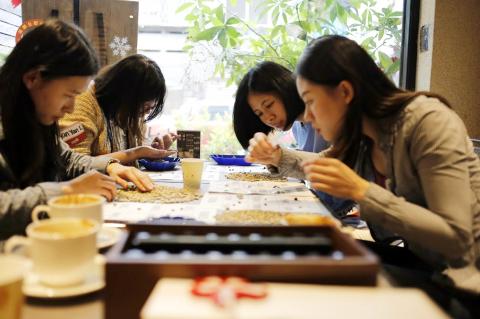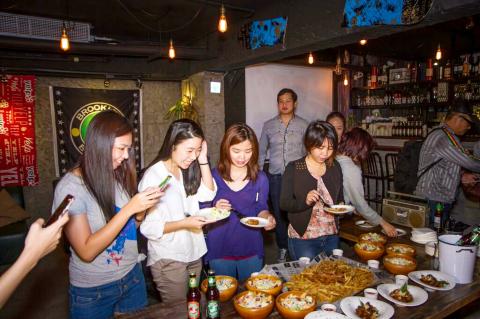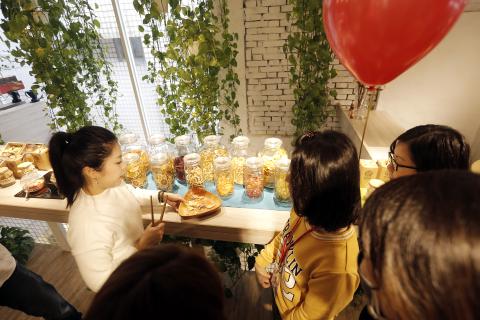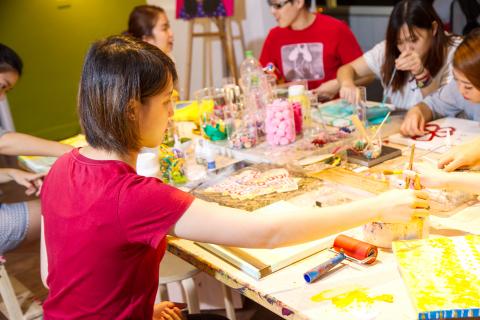When Ranley Kuo (郭潤宇) first signed into Yelp in October 2010 he was looking for restaurant suggestions and pictures of food.
“I started using Yelp because a friend had suggested it,” says Kuo, who was living in New Jersey at the time. “I lost to peer pressure and downloaded the app.”
Since then, he has written over 270 reviews of restaurants, bars, cinemas, sporting goods stores and even convenience stores such as Family Mart, often during his lunch breaks from his office in Taipei.

Photo courtesy of Yelp Taipei
The Web site, Yelp.com, which launched in 2004, allows users to rate local businesses on a one to five star rating system, upload photos and write reviews based on their experience there. Yelp became available as a smartphone app in 2008. Since then, it has been expanding globally, launching in Taiwan in March of last year.
Despite its recent launch, the app has already seen a steady increase in the number of Taiwan-based users, with some members entering its “elite squad,” which is a group of users nominated by other Yelp members because they have written what are perceived to be useful reviews. Elite members receive perks such as first dibs on Yelp events.
Kuo, who is an elite member, says there is a sense of prestige that comes with the position. As a regular user, he trusts reviews by elite members more. However, the real benefit of being an elite member is that it encourages him to continue being active within the Yelp community, not just online, but offline as well.

Photo courtesy of Yelp Taipei
Part of the fun, he says, is attending Yelp events — ones for regular users as well as more exclusive events for elite members. His favorite so far was a “beer day” event, where a tarot card reader was invited to tell people’s fortunes. He’s also made friends with other people at Yelp events and they sometimes meet up on their own.
“Unless users take the initiative to meet in person, the community would probably stay online,” Kuo says. “Which is not a horrible thing, but everything is better over a beer or meal, right?”
ONLINE (AND OFFLINE) COMMUNITY

Photo courtesy of Yelp Taipei
Taiwan is a smartphone-savvy, app-addicted nation. According to an August 2014 report on TechNews.tw, Taiwanese users spend an average of over three hours a day online on their smartphones — nearly an hour longer than the worldwide average.
A survey about social networking apps conducted last month by the Taipei-based Market Intelligence and Consulting Institute (資策會產業情報研究所) found that Line was the most popular app in Taiwan, with over 80 percent of respondents saying that they are active users.
Statistics aside, walk into any cafe or metro station and you’ll find yourself surrounded by people tapping away on their smartphones or watching videos on them (often without headphones).

Photo courtesy of Yelp Taipei
Yelp Taipei’s community manager, Roxanne Lo, is well aware of how addictive smartphones can be. She introduces herself as a “heavy app user” when we meet at a French bistro tucked away in a bohemian alley near National Taiwan University. She says that she also loves wandering in alleys and discovering cool stores, such as a wine shop with board games.
It is part of her job to cultivate an offline community while growing Yelp Taipei’s online presence. So far, Lo has taken Yelp users out to catch shrimp, ice skate and Zumba.
Elite members have also learned how to pick coffee beans and make soup dumplings. Whereas the community events are casual and give people a chance to stop by after work for a drink, Lo says the elite events are more like monthly reunions.
“One of the benefits of an offline community is that it helps validate our persona online,” Lo tells me.
She’s had the opportunity through these meetups to get to know the users personally, as well as meet their family members and pets.
“I will know that my community has a lot of dog owners so I can do a doggy park event and bring frisbees,” Lo says.
FORGING FRIENDSHIPS
Elite user and expat Eifeh Strom says she enjoys events that are interactive. Strom first started using Yelp in San Francisco in 2009 and became an elite member in 2010. The first elite event she attended in Taipei was at an art studio where they were given a blank canvas and art supplies and told to just get creative.
“It was surprisingly therapeutic and so much fun,” says Strom.
Another event she attended was coffee making where she received a crash course in “latte art” — creating beautiful designs in the milk foam on top of the latte.
Like Kuo, Strom has made friends through Yelp events, mostly those that involve food.
“What’s great about the events is that you get to meet people that obviously have at least one shared love — food,” she says.
Taipei native and elite user Ashley Chiang (江翊嘉) has had a slightly different experience with building friendships through Yelp. Chiang says he tends to chat with other users online first before meeting them in person, whether at Yelp events or on their own. Usually, other users will read his reviews and add him as a friend, saying that they like his photos of food.
“The positive feedback gives me the confidence to keep on exploring more places and writing more reviews,” Chiang says.
Although he hasn’t attended any of the elite events yet, he says that he’s become good online friends with some of the other elite users. They communicate frequently via a group chat on Line app where they share ideas of places to visit.
RAVE AND RANTS
But as with any app, there’s bound to be drawbacks. For instance, Strom finds that most of the food ratings (in English) are written by people who are visiting for only a few days and so their ratings aren’t necessarily an accurate gauge of the food scene.
She also thinks it’s common for people to only rate places if they wish to “complain about something or rave about something.”
Strom says she prefers to review all places — good, bad or mediocre. She also enjoys adding small mom-and-pop restaurants and food stands to Yelp that might otherwise go unnoticed.
Chiang agrees that many users only give one star or five stars, and that only by increasing the number of users will an accurate picture emerge.
He adds that when writing a review, “sometimes it just depends on the person’s mood on the day.”
Chiang raises another problem. Users may not always want to share their favorite restaurant because they fear it may become too popular. He admitted to being guilty of this minor crime.
There also seems to be a split between local and foreign users. As an expat or traveler, it might be difficult to gauge what the local scene is like without being able to read reviews in the local language or understand the cultural references.
Chiang, who found Yelp helpful when he visited Hong Kong, says that although he can read Chinese, a lot of the reviews included Cantonese slang that foreign users might not be able to understand. He thinks it might be the case with Taiwan too.
As with many apps, Yelp is what you make it. Kuo says the purpose of having different viewpoints is to give the reader a variety of perspectives before deciding if they want to be a customer.
“That’s what’s so great about it — you have a community of people from different walks of life and they are all bound to react and write about things in their own way,” he says.
While Kuo prefers to summarize the overall experience as opposed to describing the food in depth, he understands that other reviewers may get into lengthy descriptions of flavors and ingredients. As long are you’re not writing reviews like “the food was yummy” or “the restaurant was good,” different users will find different aspects of the review useful.
Not to mention, like other apps, it doesn’t take much detective work to sift through the raves and rants to find a helpful review.
Instead, Yelp prefers to keep their raves offline. Their next big event will be a pop art themed party at Taipei Artist Village on April 21. Entry, food and drinks are free with Yelp check-in.

The depressing numbers continue to pile up, like casualty lists after a lost battle. This week, after the government announced the 19th straight month of population decline, the Ministry of the Interior said that Taiwan is expected to lose 6.67 million workers in two waves of retirement over the next 15 years. According to the Ministry of Labor (MOL), Taiwan has a workforce of 11.6 million (as of July). The over-15 population was 20.244 million last year. EARLY RETIREMENT Early retirement is going to make these waves a tsunami. According to the Directorate General of Budget Accounting and Statistics (DGBAS), the

Many will be surprised to discover that the electoral voting numbers in recent elections do not entirely line up with what the actual voting results show. Swing voters decide elections, but in recent elections, the results offer a different and surprisingly consistent message. And there is one overarching theme: a very democratic preference for balance. SOME CAVEATS Putting a number on the number of swing voters is surprisingly slippery. Because swing voters favor different parties depending on the type of election, it is hard to separate die-hard voters leaning towards one party or the other. Complicating matters is that some voters are

Five years ago, on the verge of the first COVID lockdown, I wrote an article asking what seemed to be an extremely niche question: why do some people invert their controls when playing 3D games? A majority of players push down on the controller to make their onscreen character look down, and up to make them look up. But there is a sizable minority who do the opposite, controlling their avatars like a pilot controls a plane, pulling back to go up. For most modern games, this requires going into the settings and reconfiguring the default controls. Why do they

Take one very large shark, a boat (we’re gonna need a bigger one of those) and a movie that ran way over budget and you’ve got all the ingredients of a career-making film for one of Hollywood’s most successful directors. Now fans of Jaws — Steven Spielberg’s terrifying thriller about a man-eating shark — can re-live the movie as it celebrates its 50th anniversary in an exhibition at the Academy Museum in Los Angeles. “The film certainly cost me a pound of flesh, but gave me a ton of career,” Spielberg told reporters as he toured exhibits of props and memorabilia